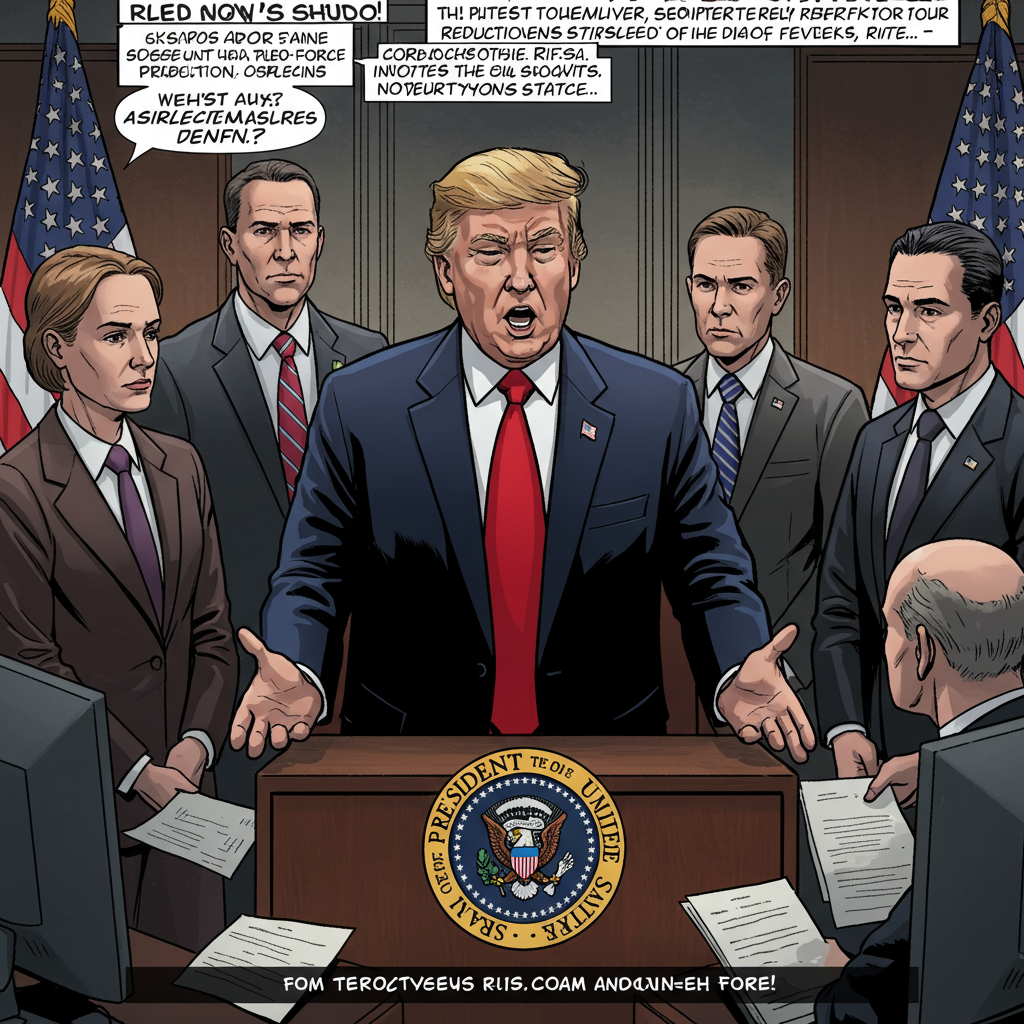President Donald Trump’s ambitious legislative agenda, often described as his “big, beautiful bill,” has reached a critical bottleneck on Capitol Hill. After intense drafting and negotiation, senate Republicans have unveiled their extensive version of the colossal package. However, its journey to the President’s desk is fraught with peril, marked by deep internal divisions and a public “family feud” fracturing the Republican party across both the house and Senate chambers.
This substantial bill represents a month-long effort in the Senate to modify and advance the version previously passed by the House GOP. Drawing input from ten different Senate committees, the final Senate text was formally released late on a Friday night by Senate Budget Committee Chair Lindsey Graham. Navigating this complex legislation requires a simple procedural vote known as the “motion to proceed.” Passing this motion is crucial, as it triggers a finite countdown towards a final vote on the bill itself.
Urgency and a Tight Legislative Calendar
The legislative timeline for this pivotal bill is exceptionally compressed. Emerging from a Friday lunch, Senate Republicans signaled a strong possibility that the vote on the motion to proceed could occur as early as Saturday afternoon. This swift action underscores the pressing goal articulated by Senate Majority Leader John Thune: getting the bill signed into law by the Fourth of July. Such an ambitious deadline highlights the intense desire within Republican leadership to secure a major legislative victory before the Independence Day recess.
Expressing firm support for rapid advancement, Senator John Kennedy publicly urged Leader Thune to bring the bill to the floor without delay. “It’s time to start voting,” Kennedy stated emphatically, while seemingly dismissing potential opposition within his party with a pointed comment about managing “hurt feelings reports.” Despite this push for speed, significant legislative hurdles remain, casting doubt on whether Leader Thune’s patriotic deadline can realistically be met.
The Parliamentarian and the Byrd Rule Challenge
A significant obstacle emerged not from political gridlock, but from the Senate Parliamentarian. This non-partisan arbiter of Senate rules issued rulings indicating that numerous provisions included by Republicans in the bill did not comply with established procedures. This is particularly problematic for legislation being advanced through the budget reconciliation process.
The reconciliation process is a powerful tool that allows certain budget-related bills to pass the Senate with a simple majority of 51 votes, circumventing the standard 60-vote threshold required to break a filibuster. However, to qualify for reconciliation, provisions must strictly adhere to the Byrd Rule. This rule mandates that provisions must directly impact federal spending or revenues and cannot be merely incidental policy changes. The Parliamentarian’s rulings forced lawmakers to redraft or remove specific elements, such as proposed changes to the Medicaid provider tax rate and cost-sharing rules for food benefits. This necessity to rework parts of the bill has inevitably slowed down the process and potentially alienated factions within the party who championed those particular provisions.
Policy Divides Fueling the GOP “Family Feud”
The internal Republican struggle extends far beyond procedural technicalities; it is deeply rooted in substantial policy disagreements. Republican leaders, White House officials, and various GOP factions have engaged in exhaustive negotiations attempting to bridge these wide divides. Several key issues have become major flashpoints within the party, driving the visible conflict.
A primary area of contention revolves around proposed reforms to Medicaid. The bill contains significant changes that critics, including some Republicans like Senator Josh Hawley, warn could result in millions of people losing essential health coverage. The nonpartisan Congressional Budget Office (CBO) previously estimated that the House version could lead to approximately 8.6 million individuals losing coverage. House Speaker Mike Johnson has defended these changes, framing them as necessary steps to eliminate “fraud, waste and abuse.” He cited examples like “illegal aliens on Medicaid” or “young men… not working” benefiting from the program. However, Senator Ron Johnson has also voiced criticism, arguing the bill could harm access while failing to adequately address the national debt. Adding another layer of complexity, President Trump reportedly instructed House Republicans earlier not to “f around with Medicaid,” highlighting the political sensitivity of this issue. To mitigate concerns that proposed changes could negatively impact rural hospitals, which often rely heavily on Medicaid payments, the Senate version attempted to address this by adding a $25 billion stabilization fund.
Another highly contentious issue is the cap on state and local tax (SALT) deductions. The House version initially proposed a $40,000 cap, a significant alteration from existing law. Senate Republicans have shown strong resistance to this provision. Reports emerged indicating a potential compromise acceptable to both the White House and House: maintaining the $40,000 cap for five years, then reducing it to $10,000 thereafter. Senator Markwayne Mullin has played a mediating role in these delicate discussions, expressing uncertainty if colleagues would “love it” but hopeful that enough support could be garnered for passage.
House conservatives have also launched a public battle against the Senate over other significant modifications. They fiercely oppose the Senate’s approach to green energy tax credits originating from the Inflation Reduction Act (IRA). Labeling these credits the “Green New Scam,” conservatives object strongly to the Senate version deferring their expiration date. Additionally, concerns have been raised about the proposed U.S. debt limit increase. The Senate’s version reportedly increases it by $5 trillion, a trillion more than the House version. This higher figure is alarming to fiscal conservatives who feel the bill does not include sufficient spending cuts and moves further away from balancing the budget, despite the significant increase in the deficit the bill is projected to cause (the CBO estimated $2.3 trillion over 10 years for the House version alone).
Elon Musk’s High-Profile Criticism Adds Pressure
Adding a unique wrinkle to the already tense political landscape, tech entrepreneur Elon Musk has publicly and vociferously criticized the bill, amplifying the internal GOP discord. Musk, who previously led an administration team focused on cutting government costs (Doge) but stepped down, called the bill a “disgusting abomination” and a “massive, outrageous, pork-filled Congressional spending bill.” He argued it would “massively increase the already gigantic budget deficit” and saddle citizens with “crushingly unsustainable debt,” urging Americans to contact lawmakers and “kill the bill.”
Musk’s criticism carries weight due to his significant financial contributions to Republican candidates and his increasing influence in conservative political circles. His comments directly challenged the bill championed by President Trump. Trump responded sharply, reportedly calling Musk “crazy” and suggesting his opposition stemmed solely from the bill’s removal of an electric vehicle tax credit beneficial to his company, Tesla – a move Trump claimed he had planned for months. Trump even threatened to sever U.S. government business ties with Musk’s ventures, citing it as an easy way to save money.
While some Republicans like Representative Troy Nehls criticized Musk, many others, like Representative Tom Massie, subtly defended his concerns about the deficit. House Speaker Mike Johnson confirmed speaking with Musk, finding him “pretty dug in” against the bill but defended the legislation as a significant tax cut package combined with border security investments. Senate Majority Leader John Thune acknowledged Musk’s focus on the CBO deficit estimate but countered that future estimates factoring in economic growth would present a more favorable view. Despite leadership dismissing Musk’s public attacks, they undeniably add pressure, particularly in the Senate where Republican margins are thin. The White House attempted damage control with a “myth buster” statement claiming deficit increase assertions were a “hoax” and that the bill would improve the fiscal trajectory and unleash economic growth.
Within the broader push for fiscal responsibility, reports indicate the Trump administration is also exploring ways to cut “waste, fraud and abuse” in Medicare to help offset the bill’s costs, an approach Trump has reportedly endorsed, expanding the search for savings beyond Medicaid. Additionally, the proposed $9.4 billion in specific spending cuts identified by the Doge team, targeting areas like foreign aid, USAID, NPR, and PBS funding, are seen as efforts to appease fiscal conservatives concerned about the bill’s overall price tag.
Navigating the Political Battleground
The internal “family feud” explicitly pits House conservatives, often associated with the Freedom Caucus, against their Senate Republican counterparts. House conservatives warn that the changes made in the Senate version significantly weaken the bill and risk losing their support. Prominent figures like House Freedom Caucus Chairman Andy Harris declared he would vote “NO” if the Senate returned a version similar to the one being discussed, a notable shift from his earlier “present” vote that allowed the initial House bill to pass. Given the House’s extremely narrow one-vote margin for passing its original version, Speaker Mike Johnson has urgently pleaded with the Senate to minimize substantive alterations.
Senate Republicans have acknowledged the inherent difficulty in crafting a sprawling, complex bill that satisfies every faction. Senator Lindsey Graham downplayed the threats from the House, suggesting the Senate’s version represented an improvement. Senator John Cramer questioned how conservatives could oppose a bill containing core GOP objectives like permanent tax cuts and significant reforms, even amidst disagreements on other points.
Republican leaders and the White House are banking on a combination of internal party pressure, the strong desire to achieve a major legislative victory, and potentially the looming deadline of the July 4th recess to compel reluctant lawmakers to ultimately support the bill. President Trump himself is actively pushing for passage by the holiday. Treasury Secretary Scott Bessent has echoed this urgency, arguing the bill provides critical “tax certainty” for businesses that he believes will significantly accelerate the economy in the third quarter.
The Procedural Gauntlet Ahead
Assuming the initial motion to proceed passes with a simple majority, the bill faces a complex and potentially protracted legislative journey. This process begins with a mandatory 20 hours of debate, equally divided between Republicans and Democrats. While Republicans may not utilize their full time allotment, Democrats are expected to use theirs completely to highlight their objections and shape the narrative.
Following the debate period comes the dreaded “vote-a-rama.” This phase allows senators to offer a virtually unlimited number of amendments to the bill. Democrats are anticipated to propose numerous “messaging” amendments specifically designed to force politically difficult votes for Republicans, adding considerable time and political drama to the process. Only after the vote-a-rama concludes will lawmakers finally move to a decisive vote on the bill itself. If it successfully passes the Senate, it must then return to the House of Representatives. There, Speaker Johnson will once again face the formidable challenge of securing enough votes to pass the Senate’s amended version – a task made significantly harder by the House’s already razor-thin margin and the intensified internal GOP tensions.
Frequently Asked Questions
What are the main points of conflict keeping Republicans divided on the bill?
Internal Republican disagreements primarily center on several key policy areas within the bill. These include proposed changes to Medicaid, where concerns exist regarding potential cuts to access versus addressing fraud. The cap on State and Local Tax (SALT) deductions is another significant hurdle, with proposed compromises facing skepticism from various factions. Additionally, House conservatives are sharply at odds with the Senate over retaining green energy tax credits from previous legislation and strongly object to the Senate’s proposed higher increase in the U.S. debt limit, arguing the bill fails to include sufficient spending cuts despite adding significantly to the national debt.
How does the Senate plan to pass this complex bill with only a simple majority?
The bill is being advanced using the budget reconciliation process. This special legislative procedure allows certain bills, specifically those impacting federal spending, revenues, and the national debt limit, to bypass the standard Senate requirement of 60 votes needed to overcome a filibuster. Reconciliation bills can pass the Senate with a simple majority of 51 votes (or 50 with the Vice President casting a tie-breaking vote). However, a strict condition for using this process is adhering to the Byrd Rule, which prevents the inclusion of non-budgetary provisions and is enforced by the Senate Parliamentarian.
What happens next if the Senate manages to pass its version of the bill?
If the Senate succeeds in passing its version of the bill, it will then be sent back to the House of Representatives. This is necessary because the Senate made changes to the original version passed by the House. The House must then hold a vote on the Senate’s amended text. Given that the House initially passed its version by an extremely narrow one-vote margin, obtaining sufficient support for the Senate’s version, which has drawn significant criticism from some House conservatives, presents a substantial political challenge for House Speaker Mike Johnson.
Word Count Check: 1210




